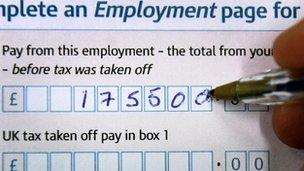Pensions tax relief reaches £33bn
- Published

Pension tax relief at just 20% might save the government more than £2bn
The amount of tax relief granted to people saving in registered pension schemes reached £32.9bn in 2010-11, figures from HM Revenue & Customs show.
Pensions receive some of the largest amounts of relief in the UK tax system.
The Chief Secretary to the Treasury, Danny Alexander, suggested recently that the relief given to higher-rate taxpayers should be restricted to help the government save money.
The value of pensions tax relief has risen by 87% in the past 10 years.
Of the £32.9bn given in relief in the last financial year, £6.6bn was accrued directly by individuals contributing to company or personal pension schemes.
A further £19.4bn was foregone by the exchequer because employer pension contributions are not liable for taxation.
And pension schemes are also exempt from paying tax on their investment income, costing £6.8bn.
In addition to the £32.9bn, employers were also exempt from paying national insurance on the pension contributions they made, costing the Revenue an extra £13bn last year.
John Whiting, of the Chartered Institute of Taxation, said the figures indicated that company pension schemes were not dead yet.
"The relief on employee contributions has been pretty steady for the last few years, but the relief for employer contributions has risen a lot, probably because employers have had to put a lot more money into their schemes to plug deficits," he said.
Changes 'unlikely'
The HMRC has previously estimated that basic-rate taxpayers receive 39% of all personal tax relief, which would amount to £2.57bn of the £6.6bn for 2010-11.
HMRC estimates higher-rate taxpayers receive 43% of the relief - implying a total of £2.84bn in 2010-11.
And 18% of the relief is estimated to go to additional-rate taxpayers earning more than £150,000, which would give an estimated £1.2bn of relief.
Mr Alexander's suggested restriction of all personal relief to just 20p in the pound would lead to an estimated overall saving of about £2.14bn.
Tom McPhail of Hargreaves Lansdown said it was highly unlikely that pensions tax relief would be restricted in the forthcoming Budget.
"Firstly because at a practical level it is difficult to do without imposing significant complexity on the system," he said.
"Secondly it would be a very awkward U-turn for the Treasury to execute having reintroduced full higher-rate relief only about a year ago."
More to come
Other savings on pensions tax relief are already in the pipeline.
The newly elected coalition government decided in 2010 that from 2011-12, the annual amount by which someone's pension pot can increase in value (either through employee and employer contributions, or through benefit accrual in a final-salary scheme) would be reduced from £255,000 a year to £50,000.
And from the 2012-13 tax year, the total value of anyone's accrued pension pot at retirement - the so-called lifetime allowance - will be reduced from £1.8m to £1.5m.
The tax authorities estimate that these two measures will soon save about £4bn a year in tax relief.